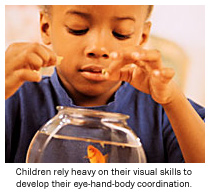Childrens Vision
Common Conditions
Contact Lens News
Miscellaneous
Nutrition and Eyes
Safety Eyewear
Sports
Preschool Vision
 During the infant and toddler years, your child has been developing many vision skills and has been learning how to see. In the preschool years, this process continues as your child develops visually guided eye-hand-body coordination, fine motor skills and the visual motor skills necessary to learn to read.
During the infant and toddler years, your child has been developing many vision skills and has been learning how to see. In the preschool years, this process continues as your child develops visually guided eye-hand-body coordination, fine motor skills and the visual motor skills necessary to learn to read.
As a parent, you should watch for signs that may indicate a vision development problem, including a short attention span for the child's age; difficulty with eye-hand-body coordination in ball play and bike riding; avoidance of coloring and puzzles and other detailed activities.
There are everyday things that you can do at home to help your preschooler's vision develop as it should.
These activities include reading aloud to your child and letting him or her see what you are reading; providing a chalkboard, finger paints and different shaped blocks and showing your child how to use them in imaginative play; providing safe opportunities to use playground equipment like a jungle gym and balance beam; and allowing time for interacting with other children and for playing independently.
By age 3, your child should have a thorough optometric eye examination to make sure your preschooler's vision is developing properly and there is no evidence of eye disease. If needed, your doctor can prescribe treatment including glasses and/or vision therapy to correct a vision development problem.
Here are several tips to make your child's optometric examination a positive experience:
- Make an appointment early in the day. Allow about one hour.
- Talk about the examination in advance and encourage your child's questions.
- Explain the examination in your child's terms, comparing the E chart to a puzzle and the instruments to tiny flashlights and a kaleidoscope.
Unless your doctor of optometry advises otherwise, your child's next eye examination should be at age 5. By comparing test results of the two examinations, your optometrist can tell how well your child's vision is developing for the next major step...into the school years.
(c)2006-2008 American Optometric Association. All Rights Reserved.